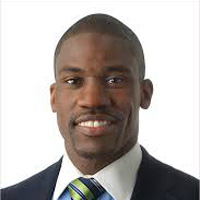When Athletes Go From 0 to 60: Managing a Sudden Influx of Wealth
Once a player makes it to the NFL or the NBA, they need to step up their financial game. With big salaries and bonuses can come even bigger mistakes.


Profit and prosper with the best of Kiplinger's advice on investing, taxes, retirement, personal finance and much more. Delivered daily. Enter your email in the box and click Sign Me Up.
You are now subscribed
Your newsletter sign-up was successful
Want to add more newsletters?

Delivered daily
Kiplinger Today
Profit and prosper with the best of Kiplinger's advice on investing, taxes, retirement, personal finance and much more delivered daily. Smart money moves start here.

Sent five days a week
Kiplinger A Step Ahead
Get practical help to make better financial decisions in your everyday life, from spending to savings on top deals.

Delivered daily
Kiplinger Closing Bell
Get today's biggest financial and investing headlines delivered to your inbox every day the U.S. stock market is open.

Sent twice a week
Kiplinger Adviser Intel
Financial pros across the country share best practices and fresh tactics to preserve and grow your wealth.

Delivered weekly
Kiplinger Tax Tips
Trim your federal and state tax bills with practical tax-planning and tax-cutting strategies.

Sent twice a week
Kiplinger Retirement Tips
Your twice-a-week guide to planning and enjoying a financially secure and richly rewarding retirement

Sent bimonthly.
Kiplinger Adviser Angle
Insights for advisers, wealth managers and other financial professionals.

Sent twice a week
Kiplinger Investing Weekly
Your twice-a-week roundup of promising stocks, funds, companies and industries you should consider, ones you should avoid, and why.

Sent weekly for six weeks
Kiplinger Invest for Retirement
Your step-by-step six-part series on how to invest for retirement, from devising a successful strategy to exactly which investments to choose.
Professional athletes who manage wealth wisely understand it requires budgeting, planning, financial analysis and trustworthy experts in your corner. I tell my clients if they can be as disciplined with their money as they are with their athletic training, they are on the right path. Even MVPs need to budget.
A famous Sports Illustrated analysis from 2009 showed that 78% of NFL players are bankrupt, or nearly so, just two years after their career ends, and 60% of NBA retirees lose it all in five years.
The career of a professional athlete is finite and may be sporadic. A player can get injured at any moment, or be called into the coach’s office and told he is being released from the team. The average pro athlete’s career is about 10 years, and just 3.5 years for an NFL player. That means if you start your career at 20 years old and live to the average age of 79, you have 49 years left to budget for.
From just $107.88 $24.99 for Kiplinger Personal Finance
Become a smarter, better informed investor. Subscribe from just $107.88 $24.99, plus get up to 4 Special Issues

Sign up for Kiplinger’s Free Newsletters
Profit and prosper with the best of expert advice on investing, taxes, retirement, personal finance and more - straight to your e-mail.
Profit and prosper with the best of expert advice - straight to your e-mail.
For a professional athlete whose livelihood is on an upward trajectory, now is the time to create a whole-life plan that includes everything from taking care of your family to tax reduction to retirement from the field and desired lifestyle after professional sports.
Hire experts
Balanced and straightforward expert advice will extend your success beyond game day. A good financial adviser will coach you through the planning process and match you with an appropriate asset allocation strategy, a diversified investment portfolio, and planning for your life after professional sports.
A qualified Certified Public Accountant (CPA) is your tax coach. The right accountant understands the lifestyle of a professional athlete and delivers proactive tax planning to help you keep as much of your earnings as possible.
Players will be approached by advisers who want their business. I advise my clients to interview a few different advisers before settling on one. My advice for vetting advisers is to surround yourself with a professor, a coach and reliable, trusted teammates who have your best interests in mind. They will help guide you.
The FINRA BrokerCheck website, brokercheck.finra.org, is another resource that can help you obtain a financial adviser’s history. This is a resource to inform the general public which financial advisers have been sanctioned or sued or have complaints against them. Some sports teams even have advisers on staff.
Set goals
Take it slow on those big-ticket purchases like a house, a car and the jewelry collection you’ve been dreaming of. Think about your long-term and short-term goals. What do you want to accomplish with your wealth? What are your goals for the future? What are your post-career business interests?
Setting financial objectives can also help avoid overspending. Committing yourself to a goal, for example, of paying cash for a vacation home, might just keep your eye on the prize and help you create a habit of mindful spending and saving.
Create a budget
It’s time to create a plan that encompasses all aspects of your financial life. Work with your adviser to determine what you need to live a comfortable lifestyle. It will take some thought and time to create an accurate budget — from agent fees to mortgage payments, right down to your phone bill and your morning stop at the coffee house.
You’ll also need to ask yourself: Do I go out a lot? Will family and friends be looking for financial help? Do you want a portion of your budget set aside for helping those close to you? Who do you want to help, and how? Do you need support addressing family or friends who want money from you? A proper budget should account for all of it.
I had a client with at least five high-priced vehicles. He generously gave allowances to friends and family. After a half-dozen extravagant vacations and a streak of poor spending choices, his lack of budgeting nearly drove him into bankruptcy.
Another client simply never gathered the tools, skills or drive most everyone needs to manage their personal lives. He was unwilling to do anything on his own and relied entirely on his team of advisers to manage every piece of his finances. Even with millions of dollars in the bank, this client did not pay his property taxes, and his home — paid for in full — was sold at auction. Gone. His career was a finite one. He did not live up to his potential off the field or on.
Plan for the unexpected
Ask your financial adviser or your agent to recommend a responsible insurance broker. Short-term and long-term disability insurance, along with basic umbrella coverage, protects you from unforeseen circumstances.
I have a client whose dog got loose in the neighborhood and bit a person. Initially, the victim wanted reimbursement for the medical expenses associated with the accident — until he became aware the animal belonged to a professional athlete, at which point he called a lawyer. If not for umbrella coverage, my client would have been paying out a hefty settlement because of this accident.
There is no universal prescription for financial wellness. However, if you take my advice and follow through on the four points above — hiring experts, setting goals, creating a budget and planning for the unexpected — you will reap the benefits of a durable financial plan that will help you manage your wealth wisely.
Profit and prosper with the best of Kiplinger's advice on investing, taxes, retirement, personal finance and much more. Delivered daily. Enter your email in the box and click Sign Me Up.

Kevin Monroe joined CAPTRUST in 2003 as a vice president and financial adviser. He is responsible for providing comprehensive wealth-management and retirement advisory services to professional athletes and high-net-worth investors. Prior to joining the firm, Kevin served as a financial adviser at AXA Advisors and First Union Securities and has worked in the industry since 2000.
-
 Quiz: Do You Know How to Avoid the "Medigap Trap?"
Quiz: Do You Know How to Avoid the "Medigap Trap?"Quiz Test your basic knowledge of the "Medigap Trap" in our quick quiz.
-
 5 Top Tax-Efficient Mutual Funds for Smarter Investing
5 Top Tax-Efficient Mutual Funds for Smarter InvestingMutual funds are many things, but "tax-friendly" usually isn't one of them. These are the exceptions.
-
 AI Sparks Existential Crisis for Software Stocks
AI Sparks Existential Crisis for Software StocksThe Kiplinger Letter Fears that SaaS subscription software could be rendered obsolete by artificial intelligence make investors jittery.
-
 Social Security Break-Even Math Is Helpful, But Don't Let It Dictate When You'll File
Social Security Break-Even Math Is Helpful, But Don't Let It Dictate When You'll FileYour Social Security break-even age tells you how long you'd need to live for delaying to pay off, but shouldn't be the sole basis for deciding when to claim.
-
 I'm an Opportunity Zone Pro: This Is How to Deliver Roth-Like Tax-Free Growth (Without Contribution Limits)
I'm an Opportunity Zone Pro: This Is How to Deliver Roth-Like Tax-Free Growth (Without Contribution Limits)Investors who combine Roth IRAs, the gold standard of tax-free savings, with qualified opportunity funds could enjoy decades of tax-free growth.
-
 One of the Most Powerful Wealth-Building Moves a Woman Can Make: A Midcareer Pivot
One of the Most Powerful Wealth-Building Moves a Woman Can Make: A Midcareer PivotIf it feels like you can't sustain what you're doing for the next 20 years, it's time for an honest look at what's draining you and what energizes you.
-
 I'm a Wealth Adviser Obsessed With Mahjong: Here Are 8 Ways It Can Teach Us How to Manage Our Money
I'm a Wealth Adviser Obsessed With Mahjong: Here Are 8 Ways It Can Teach Us How to Manage Our MoneyThis increasingly popular Chinese game can teach us not only how to help manage our money but also how important it is to connect with other people.
-
 Looking for a Financial Book That Won't Put Your Young Adult to Sleep? This One Makes 'Cents'
Looking for a Financial Book That Won't Put Your Young Adult to Sleep? This One Makes 'Cents'"Wealth Your Way" by Cosmo DeStefano offers a highly accessible guide for young adults and their parents on building wealth through simple, consistent habits.
-
 Global Uncertainty Has Investors Running Scared: This Is How Advisers Can Reassure Them
Global Uncertainty Has Investors Running Scared: This Is How Advisers Can Reassure ThemHow can advisers reassure clients nervous about their plans in an increasingly complex and rapidly changing world? This conversational framework provides the key.
-
 I'm a Real Estate Investing Pro: This Is How to Use 1031 Exchanges to Scale Up Your Real Estate Empire
I'm a Real Estate Investing Pro: This Is How to Use 1031 Exchanges to Scale Up Your Real Estate EmpireSmall rental properties can be excellent investments, but you can use 1031 exchanges to transition to commercial real estate for bigger wealth-building.
-
 The 8 Stages of Retirement: An Expert Guide to Confidence, Flexibility and Fulfillment, From a Financial Planner
The 8 Stages of Retirement: An Expert Guide to Confidence, Flexibility and Fulfillment, From a Financial PlannerRetirement planning is less about hitting a "magic number" and more about an intentional journey — from understanding your relationship with money to preparing for your final legacy.